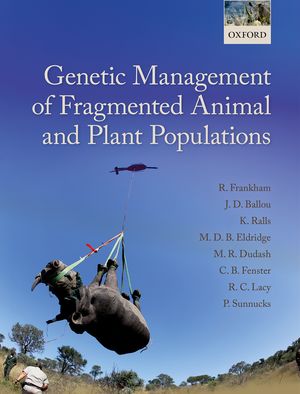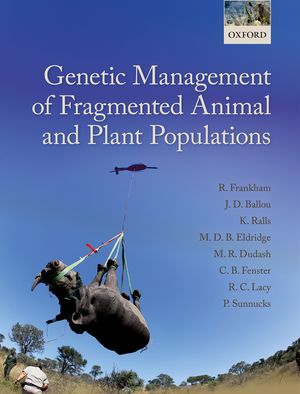Genetic Management of Fragmented Animal and Plant Populations

Genetic Management of Fragmented Animal and Plant Populations
|
ISBN: |
9780198783398 |
|
Binding: |
Hardback |
|
Published: |
27 Jul 2017 |
|
Availability: |
|
|
Series: |
$276.95 AUD
$312.99 NZD
Request an inspection copyDescription
One of the greatest unmet challenges in conservation biology is the genetic management of fragmented populations of threatened animal and plant species. More than a million small, isolated, population fragments of threatened species are likely suffering inbreeding depression and loss of evolutionary potential, resulting in elevated extinction risks. Although these effects can often be reversed by re-establishing gene flow between population fragments, managers very rarely do this. On the contrary, genetic methods are used mainly to document genetic differentiation among populations, with most studies concluding that genetically differentiated populations should be managed separately, thereby isolating them yet further and dooming many to eventual extinction! Many small population fragments are going extinct principally for genetic reasons. Although the rapidly advancing field of molecular genetics is continually providing new tools to measure the extent of population fragmentation and its genetic consequences, adequate guidance on how to use these data for effective conservation is still lacking.
This accessible, authoritative text is aimed at senior undergraduate and graduate students interested in conservation biology, conservation genetics, and wildlife management. It will also be of particular relevance to conservation practitioners and natural resource managers, as well as a broader academic audience of conservation biologists and evolutionary ecologists.
- Provides a novel, authoritative and timely treatment of the genetic management of fragmented populations, with practical implications in conservation biology
- Seeks to provoke a paradigm shift in the management of small isolated population fragments of animals and plants
- Includes management recommendations
- Written by leaders in the field who have conducted pioneering work on inbreeding depression and its conservation relevance
Contents
1: Introduction
Section 1: Genetic problems in small isolated populations
2: Evolutionary genetics of small populations
3: Inbreeding reduces reproductive fitness
4: Loss of genetic diversity reduces ability to adapt
5: Population fragmentation causes inadequate gene flow and increases extinction risk
Section 2: Rescue and risk
6: Genetic rescue by augmenting gene flow
7: Outbreeding depression is uncommon and predictable
8: Modified rescue and risk expectations for species with diverse mating systems and modes of inheritance
Section 3: Developing management decisions
9: Is the taxonomy appropriate? Delineating species for conservation purposes
10: Determining the number and location of genetically differentiated population fragments
11: Are there populations suffering genetic erosion that would benefit from augmented gene flow?
12: Managing gene flow among isolated population fragments. I. Limited information
13: Managing gene flow among isolated population fragments. II. Management based on kinship
14: Global climate change increases the need for genetic management
15: Take home messages
Authors
Richard Frankham, Emeritus Professor, Department of Biological Sciences, Macquarie University, Australia
Jonathan D. Ballou, Scientist Emeritus, Smithsonian Conservation Biology Institute, Smithsonian Institution
Katherine Ralls, Emeritus Research Zoologist, Smithsonian Conservation Biology Institute, Smithsonian Institution
Mark Eldridge, Principle Research Scientist, Terrestrial Vertebrates, Australian Museum
Michele R. Dudash, Professor and Head of the Department of Natural Resource Management, South Dakota State University
Charles B. Fenster, Professor, Department of Biology and Microbiology, South Dakota Agricultural Experiment Station
Robert C. Lacy, Senior Conservation Scientist, Chicago Zoological Society
Paul Sunnucks, Professor, School of Biological Sciences, Monash University
